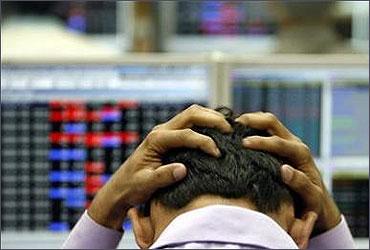
It's becoming increasingly difficult to make sense of what's driving the Indian markets.
While outward indicators seem to suggest a downward trend, a sudden spike seems to challenge this view altogether.
No wonder, mutual fund managers have been stuck with non-performing stocks over the last several years, as it's becoming difficult to predict where the markets are headed.
While many would say volatility is the new normal, it wouldn't be far off the mark to say this turnaround may be short-lived, as India's domestic problems and global risk aversion continue.
. . .

Nearly a month after the S&P downgrade, emerging markets (and equity as an asset-class) have underperformed the developed markets, as the all too familiar risk aversion comes into play.
India's year-to-date underperformance has meant it has performed relatively better than other emerging markets on a monthly basis.
So, what can one make of the sudden upward swings in the benchmark indices?
Undoubtedly, this looks like 2008, when emerging markets bore the brunt of the risk-averse behaviour of foreign institutional investors.
. . .

This time, the sell-off is not that drastic. For four consecutive days, the Nifty has closed above the 5,000-mark and technical chartists expect the same to continue.
Despite this temporary relief rally (where selective buying may happen), the downward pressure on equity could remain.
For starters, despite the sell-off, India's valuations have not yet come off meaningfully, or so believe analysts. India's valuation premium over emerging markets has corrected over the course of the year, but not meaningfully.
Also, with GDP growth slowing to 7.7 per cent in the first quarter of FY12, corporate earnings may continue to slow down, triggering off a fresh round of EPS downgrades.
. . .

This is expected after the second quarter earnings season kicks off in October. To make matters worse, the investment cycle is showing no signs of reviving. Elara Capital continues to remain cautious on banks, as the deadlock on investment cycle refuses to clear.
The Reserve Bank of India's (RBI) own projection of credit growth is lower than its deposit growth rates. Immediately, there seems to be no indication to suggest major FII fund inflows into India, as near-term concerns remain.
The only silver lining, according to Christopher Wood, author of CLSA's Greed & Fear report: "For equity investors in India, it is somewhat paradoxical to note that another wave of global risk aversion would actually be quite positive. This is because it would be likely to deter the RBI India from further tightening at its next policy meeting on September 16. This is because such increased risk aversion would likely lead to commodity price weakness."
While most economists expect a 25-basis-point rise, all eyes will be on a sign on the stance of the central bank governor.